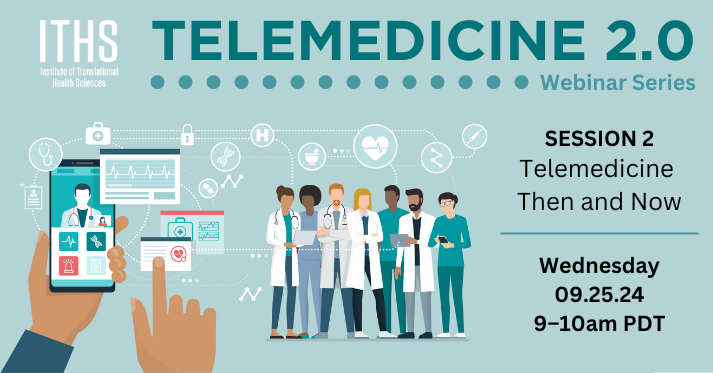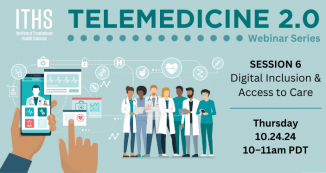
16 Aug Telehealth Then and Now
Register to receive Zoom link
Event Video
Description
Attend this session to hear about the history of telehealth, its evolution over the past decades, and what’s coming in the future.
The Telemedicine 2.0 series offers inter-disciplinary insights into telemedicine practice and development of its supporting technologies with consideration for the associated regulatory, data security, and patient privacy issues. This free online series will be hosted in six parts (one pre-recorded and five live sessions) in September and October. One registration will give you access to the all of the sessions. This opportunity is open to all eligible persons regardless of race, sex or other identity.
Event Materials
5 MBSLIDE PRESENTATION: Telehealth Then and Now
Series Learning Objectives
Upon completion of this program, participants will be able to:
- Identify opportunities to improve remote patient care
- Identify security and privacy risks associated with telemedicine technologies
- Mitigate introduction of disparities in access to clinical care
Sessions
- Telemedicine 2.0: How Is It Relevant to Me? (Pre-recorded video posted by 09.11.24)
- Telehealth Then and Now (09.25.24, 9–10am PDT)
- Telemedicine Regulatory Issues: Licensing, Standards of Practice, Billing, and Reimbursement (10.01.24, 3–4pm PDT)
- Protecting Privacy and Maintaining Security in Telemedicine (10.08.24, 3–4pm PDT)
- The Entrepreneur’s Perspective on Telemedicine Technology and Tools Development (10.15.24, 3–4pm PDT)
- Digital Inclusion and Access to Care by Telemedicine (10.24.24, 10–11am PDT)
About the Speakers
 John Scott, MD, MSc, FIDSA, is a Professor of Medicine (Division of Allergy and Infectious Diseases) and Chief Digital Health Officer at UW Medicine. He graduated from Stanford University with a degree in Human Biology, attended Georgetown University School of Medicine cum laude, completed a residency in Internal Medicine at Stanford University Hospitals, and then obtained sub-specialty training in Infectious Diseases at the University of Washington. He joined the University of Washington faculty in 2005.
John Scott, MD, MSc, FIDSA, is a Professor of Medicine (Division of Allergy and Infectious Diseases) and Chief Digital Health Officer at UW Medicine. He graduated from Stanford University with a degree in Human Biology, attended Georgetown University School of Medicine cum laude, completed a residency in Internal Medicine at Stanford University Hospitals, and then obtained sub-specialty training in Infectious Diseases at the University of Washington. He joined the University of Washington faculty in 2005.
In 2009, he launched Project ECHO (Extension for Community Health Outcomes) in Washington State, the first place to replicate the ECHO model outside of New Mexico. This innovative telehealth program helps clinicians serving in rural and underserved areas with the evaluation and treatment of common, complex, chronic diseases. In 2015, he won the Warren Reid Award for excellence in health care for the state of Washington, in recognition of his telehealth work. He chairs the Washington State Telehealth Collaborative and served on the Telehealth committee for the Infectious Disease Society of America. The Washington State Medical Association recognized him with the Grassroots Advocate Award in 2020 for his work in advocating for policy changes for telemedicine at the state and federal level.
In his role as Chief Digital Health Officer, he is focused on Virtual Care Delivery and developing a robust Digital Front Door to bring together UW Medicine’s existing technologies, apps, and other digital services into a simple, single sign-on platform.
 Cindy Lin, MD, FACSM, FAAPMR, is a Clinical Professor of Sports & Spine Medicine in the Department of Rehabilitation Medicine. She holds the Endowed Professorship of Sports and Exercise Medicine. She is the Director of Clinical Innovation for The Sports Institute. She provides sports and spine patient care at UW Husky Stadium Sports Medicine Center and Eastside Specialty Center. She serves on the Board of Trustees of the American College of Sports Medicine (ACSM), the NCAA Training and Performance Advisory Group, and is an Exercise is Medicine Governance Board Member. Before joining UW, she practiced at the Singapore Sports and Exercise Medicine Centre at Changi General Hospital in Singapore.
Cindy Lin, MD, FACSM, FAAPMR, is a Clinical Professor of Sports & Spine Medicine in the Department of Rehabilitation Medicine. She holds the Endowed Professorship of Sports and Exercise Medicine. She is the Director of Clinical Innovation for The Sports Institute. She provides sports and spine patient care at UW Husky Stadium Sports Medicine Center and Eastside Specialty Center. She serves on the Board of Trustees of the American College of Sports Medicine (ACSM), the NCAA Training and Performance Advisory Group, and is an Exercise is Medicine Governance Board Member. Before joining UW, she practiced at the Singapore Sports and Exercise Medicine Centre at Changi General Hospital in Singapore.
Please sign in below to access this form.
Access to this form is restricted to ITHS Members. Please sign in, or create an account.






